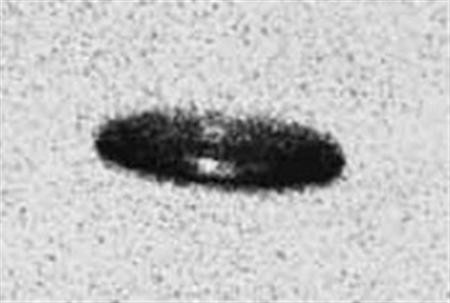
In a strange sighting, a rock in space appeared to have a black pyramid on it. The pyramid on asteroid 1999 RQ36 was identified by scientists at the ISRO labs. The alien object was discovered in our solar system on 29 June.
A one-minute 34-second video on the black pyramid was uploaded on YouTube, by UFOexposed.
The asteroid appears like a normal rock in space but when observed carefully, it seemed to be inhabited.
"This is fantastic evidence from scientists in India at the ISRO labs. The detail of this massive pyramid is fantastic and you can see two other rectangle structures on it. The asteroid is probably not for mining as much as used as a tiny space station. An asteroid that size and a structure that size is a bit out of proportion...so this cannot be a mining facility," reported UFO Sightings Daily.
"This massive structure is meant to be hidden on this small asteroid, so it is probably monitoring planets as it passes them without any primitive life discovering them... however, India was on top of it and caught it quickly. Awesome work India," it added.
Check out the video of the strange asteriod with black pyramid.
Similar sightings have been made in our solar system in the past, when the video of a UFO approaching the International Space Station (ISS) was uploaded on YouTube.
The three-minute 40-second video was uploaded by a user named 'secureteam10'. The footage shows a strange, circular rotating object coming close to the space station in March 2014.
Several YouTube users were positive about the video.
"Amazing capture on this footage!! Most certainly a curious UFO coming to check out the ISS... Anybody who disagrees is foolish!!" one of the comments read. However, some viewers disagreed and felt the video was fake or unreal.
Again on 2 April and 3 April, NASA's Curiosity rover captured an image on the surface of Mars that appeared like a beam of light. Experts feel it may have occurred due to cosmic rays hitting the camera's detector or the sunlight shining on a rock. However, the strange light raised questions about an alien residing on Mars or a UFO.
"In the thousands of images we've received from Curiosity, we see ones with bright spots nearly every week. These can be caused by cosmic-ray hits or sunlight glinting from rock surfaces, as the most likely explanations," said Justin Maki of NASA's Jet Propulsion Laboratory, Pasadena, California, who led the team that built and operates the Navigation Camera, in a NASA press release.

















